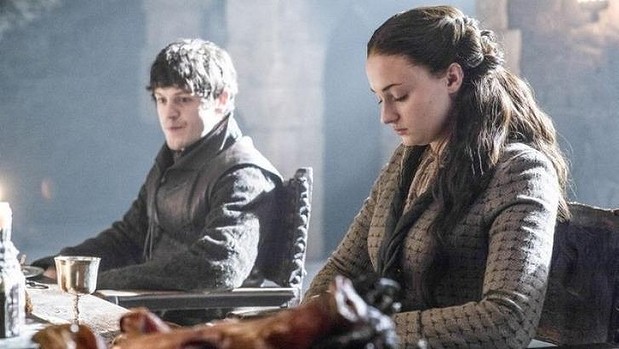Surely I can’t have been the only one who saw this coming? We’ve known for a few episodes now that in order to get her revenge on the Boltons, Sansa was going to have to marry Ramsay. We knew that, unlike Tyrion, Ramsay wasn’t about to let her get away with not consummating the marriage. And we definitely knew that he was a sadistic psychopath.
So why such shock and uproar that this plotline culminated in Sansa’s rape by Ramsay on their wedding night? Feminist e-zine The Mary Sue has announced it will no longer be promoting or discussing Game of Thrones in the wake of the scene. U.S. Senator Claire McCaskill tweeted to similar effect on Tuesday, declaring the scene “disgusting” and saying she was “done” with the show. But, in context, is such anger really justified?
Please don’t misunderstand me here. The moment in question made for highly uncomfortable viewing, as it should have done. It was shocking, and it clearly upset a lot of people, but it wasn’t exactly out of the blue. Compare it, for instance, to a similar plot development in series four of Downton Abbey. A clumsy writer at the best of times, Julian Fellowes decided to inject some drama into his increasingly stale show by having chirpy lady’s maid Anna raped by the valet of one of Downton’s guests. Not exactly what audiences expect from their Sunday night slice of cosy right-wing nostalgia.

Downton was a prime example of a TV drama milking sexual violence for the sake of entertainment, without offering any real commentary on the issue. But Game of Thrones is altogether a different kettle of fish. This is a show in which the first episode gave us beheading, prostitution, incest, attempted child-murder and, yes, a count of marital rape. No one could accuse Game of Thrones of lulling its audience into a false sense of security. As book author George R.R. Martin has said, the brutality of Westeros – sexual or otherwise – is grounded in real-life history. What’s more, the topic of rape and sexual violence against women is hotter now than it ever has been. Does TV drama not have a right, even a duty, to address the subject as well?
That said, Game of Thrones doesn’t exactly have a spotless record when it comes to dealing with the subject of rape. Last season saw similar controversy over a sex scene between twincestuous lovers Cersei and Jaime Lannister. Whilst explicitly consensual in the books, the wordless rough-and-tumble onscreen was rather too ambiguous for comfort. It was also completely out of line with Jaime’s character development, which had previously seen him lose a hand as a result of defending a female character from being raped.
The issue I and many others take with Sansa’s scene runs along the same lines. While Ramsay Bolton does indeed rape his bride in Martin’s novels, that bride is not Sansa Stark. The show’s creators gave this plotline to Sansa so that actress Sophie Turner would remain in a leading role, and to keep the audience from being burdened with yet another new character.
On the whole, Game of Thrones is a beacon of TV feminism. It’s a programme that repeatedly depicts women overcoming cruelty and misogyny to wield great power and take control of their own lives.
This is all well and good, and makes sense for the medium of television, but modifying Martin’s storyline to feature Sansa should have meant modifying this particular outcome. Because Sansa is no longer supposed to be one of Game of Thrones’ victims. From the slaying of her pet direwolf in episode two right up to this latest assault, no character in Game of Thrones has had a worse time of it than Sansa Stark. And in a show where a man has had his head crushed like a grape between another man’s hands, that’s saying something.
Sansa has been manipulated by a vicious queen, tormented by a psychotic fiancé-king, forced to marry and alcoholic dwarf and to top it all off, she believes every other member of her family is dead. Last season finally saw Sansa delivered from this conga-line of trauma by being taken under the wing of the mockingbird himself, Petyr “Littlefinger” Baelish. Following his lead, she discovered her dark side – and a new strength. She resolved to become a player in the game of thrones, rather than just another pawn.
Game of Thrones’ writers could have crafted a much more complicated, interesting scene out of Ramsay and Sansa’s wedding night.
Yet it seems like all of Sansa’s character development came out in the wash along with her black hair dye in last week’s episode. “Take this Bolton boy and make him yours” instructed Littlefinger earlier this season. “You loved your family. Avenge them.” Game of Thrones’ writers could have crafted a much more complicated, interesting scene out of Ramsay and Sansa’s wedding night. One that might have seen the spark of tenderness Sansa first seemed to inspire in Ramsay persist, one where Sansa consensually laid down her virginity to further her own cause. One that didn’t just reinforce the couple’s default character settings of ‘helpless victim’ and ‘total bastard’.
It’s worth remembering the bigger picture here. On the whole, Game of Thrones is a beacon of TV feminism. It’s a programme that repeatedly depicts women overcoming cruelty and misogyny to wield great power and take control of their own lives. However, dealing with sensitive topics on television always comes down to context. And while Sansa’s scene doesn’t make me feel inclined to abandon ship, it must be admitted that, in this case, the context didn’t justify the crime.
Rachel Groocock

